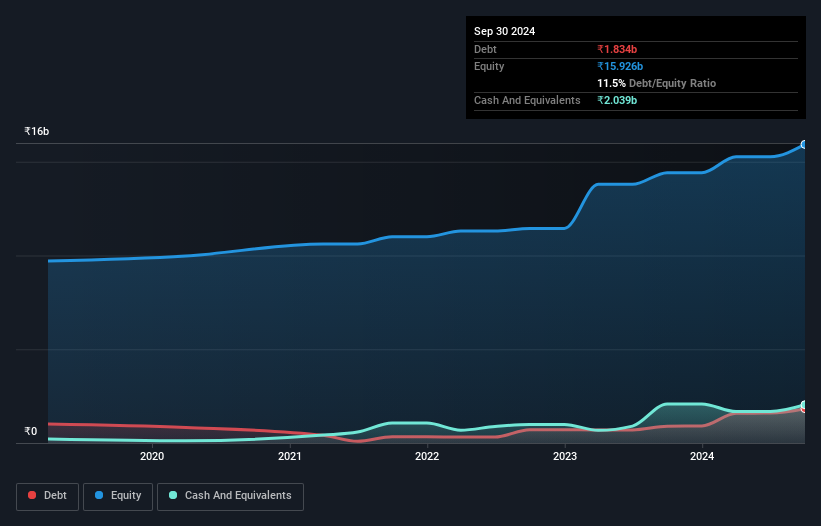- India
- /
- Energy Services
- /
- NSEI:DEEPINDS
Deep Industries (NSE:DEEPINDS) Has A Pretty Healthy Balance Sheet
David Iben put it well when he said, 'Volatility is not a risk we care about. What we care about is avoiding the permanent loss of capital.' When we think about how risky a company is, we always like to look at its use of debt, since debt overload can lead to ruin. We can see that Deep Industries Limited (NSE:DEEPINDS) does use debt in its business. But the more important question is: how much risk is that debt creating?
When Is Debt Dangerous?
Debt assists a business until the business has trouble paying it off, either with new capital or with free cash flow. Part and parcel of capitalism is the process of 'creative destruction' where failed businesses are mercilessly liquidated by their bankers. However, a more frequent (but still costly) occurrence is where a company must issue shares at bargain-basement prices, permanently diluting shareholders, just to shore up its balance sheet. Of course, the upside of debt is that it often represents cheap capital, especially when it replaces dilution in a company with the ability to reinvest at high rates of return. The first step when considering a company's debt levels is to consider its cash and debt together.
View our latest analysis for Deep Industries
What Is Deep Industries's Debt?
As you can see below, at the end of September 2024, Deep Industries had ₹1.83b of debt, up from ₹894.4m a year ago. Click the image for more detail. However, it does have ₹2.04b in cash offsetting this, leading to net cash of ₹205.8m.

A Look At Deep Industries' Liabilities
We can see from the most recent balance sheet that Deep Industries had liabilities of ₹2.45b falling due within a year, and liabilities of ₹1.49b due beyond that. Offsetting this, it had ₹2.04b in cash and ₹3.83b in receivables that were due within 12 months. So it can boast ₹1.92b more liquid assets than total liabilities.
This surplus suggests that Deep Industries has a conservative balance sheet, and could probably eliminate its debt without much difficulty. Succinctly put, Deep Industries boasts net cash, so it's fair to say it does not have a heavy debt load!
Also good is that Deep Industries grew its EBIT at 16% over the last year, further increasing its ability to manage debt. When analysing debt levels, the balance sheet is the obvious place to start. But it is Deep Industries's earnings that will influence how the balance sheet holds up in the future. So when considering debt, it's definitely worth looking at the earnings trend. Click here for an interactive snapshot.
Finally, a business needs free cash flow to pay off debt; accounting profits just don't cut it. While Deep Industries has net cash on its balance sheet, it's still worth taking a look at its ability to convert earnings before interest and tax (EBIT) to free cash flow, to help us understand how quickly it is building (or eroding) that cash balance. Over the last three years, Deep Industries saw substantial negative free cash flow, in total. While investors are no doubt expecting a reversal of that situation in due course, it clearly does mean its use of debt is more risky.
Summing Up
While it is always sensible to investigate a company's debt, in this case Deep Industries has ₹205.8m in net cash and a decent-looking balance sheet. And we liked the look of last year's 16% year-on-year EBIT growth. So we don't have any problem with Deep Industries's use of debt. There's no doubt that we learn most about debt from the balance sheet. But ultimately, every company can contain risks that exist outside of the balance sheet. For example, we've discovered 2 warning signs for Deep Industries (1 is a bit concerning!) that you should be aware of before investing here.
If, after all that, you're more interested in a fast growing company with a rock-solid balance sheet, then check out our list of net cash growth stocks without delay.
New: Manage All Your Stock Portfolios in One Place
We've created the ultimate portfolio companion for stock investors, and it's free.
• Connect an unlimited number of Portfolios and see your total in one currency
• Be alerted to new Warning Signs or Risks via email or mobile
• Track the Fair Value of your stocks
Have feedback on this article? Concerned about the content? Get in touch with us directly. Alternatively, email editorial-team (at) simplywallst.com.
This article by Simply Wall St is general in nature. We provide commentary based on historical data and analyst forecasts only using an unbiased methodology and our articles are not intended to be financial advice. It does not constitute a recommendation to buy or sell any stock, and does not take account of your objectives, or your financial situation. We aim to bring you long-term focused analysis driven by fundamental data. Note that our analysis may not factor in the latest price-sensitive company announcements or qualitative material. Simply Wall St has no position in any stocks mentioned.
About NSEI:DEEPINDS
Deep Industries
Provides oil and gas field and related support services in India.
High growth potential with excellent balance sheet.
Market Insights
Community Narratives



